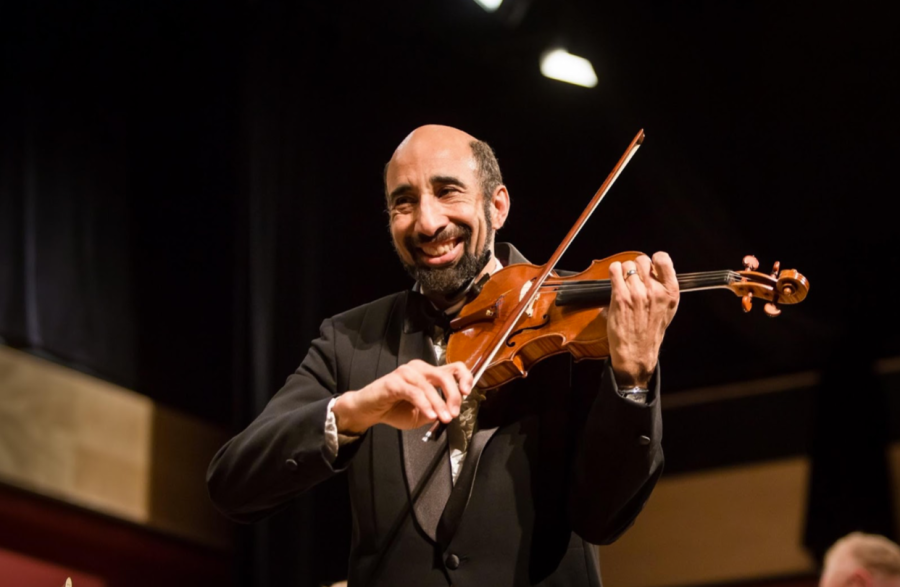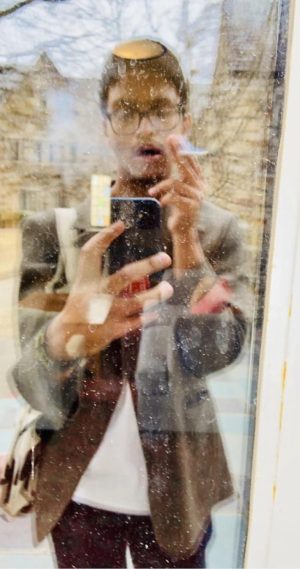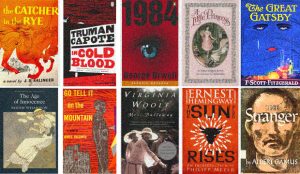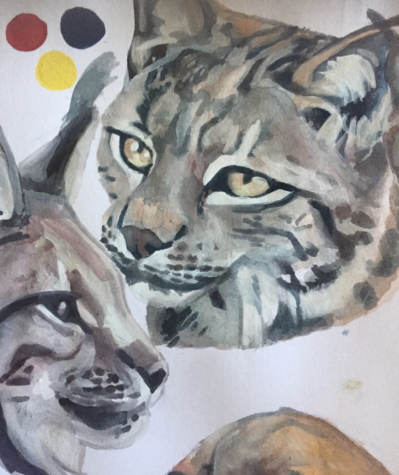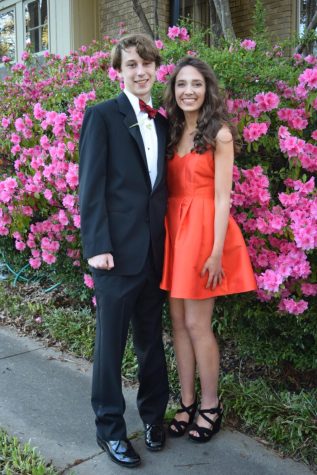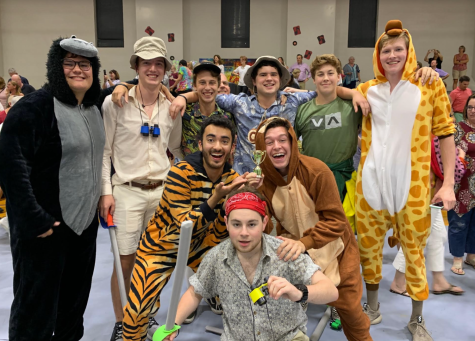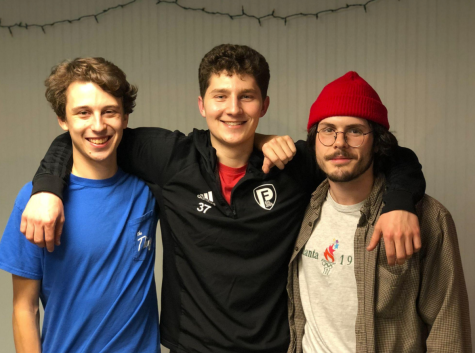Stomping on Classical Music Limitations, among Other Things with Dr. Gregory Walker
April 8, 2022
Stomp! Stomp! An ever louder Stomp! On a breezy February evening, the old McNeil hall was blessed with a lovely performance in which the Rhodes Orchestra reminisced and reimagined many sounds. The setlist contained many great compositions of the past, from Antonio Vivaldi’s Winter to George Walker’s Lyric for the Strings. Walker’s son, a composer, violinist, professor, and many other things of his rights, Gregory Walker joined the Rhodes Orchestra, and they finished up the performance with Walker’s piece “Stomp”.
I was on stage with Dr. Walker when he willingly disassembled his violin bow. As a classical string player who envied the rock performers and their habitual norm-breaking creative outflows, I was taken aback by just how unexpected and rock’n’roll the performance was. The idea of rock violin has been tried many times from the German virtuoso David Garrett with his long hair and leather jacket performing Led Zeppelin’s Kashmir, or the youtube sensation from back in the days, Lindsey Stirling giving her best rock’n’roll shot at the Phantom of the Opera. But, as you’ve already figured out, these are mostly cover versions of famous songs. Dr. Walker’s piece was not a violin rendition of your dad’s favorite Guns’N’Roses song – but it contained that rock’n’roll energy. A week after the performance, we got to talk about that energy, family dynamics, and diversifying our listening plate.
First of all, I want to point out the three generations of wonderful musicians in the Walker family – George Walker, the great American composer whose piece the orchestra performed, and his wife Helen Walker-Hill, a pianist and musicologist who specialized in the music of black women composers. Dr. Walker himself, and his wife Lori Walker, an amazing keyboardist who we got to see perform with him on stage. And we have our fellow lynx, Grayson Walker, or the Lightskin Legend, who was welcomed on the same stage with much applause (especially from the sports guys) a little less than a year ago. I wondered how it feels to be part of these three generations of all-music families, because, of course, depending on the generation, we all have our different music tastes and ways of doing things. There’s tension as well as overlap. How did that affect him and his style of playing?
“Well, the first thing that you should know that will immediately make sense, I think, is that – You grow up in that. Everything else is a little bit weird. So for example. Grayson’s brother is at the University of Chicago, and he’s not sure what he wants to major in, and he’s thinking, Man, where do I go with what’s the future hold? There is never that choice for a classical musician brought up in that kind of environment. I mean, technically there is. But I just knew I was going to be a musician, which was kind of sad because I completely sucked… It wasn’t well-received by my parents, either. But I just didn’t accept that. And I think that’s probably as big an influence on me as anything else, just the aspect of not accepting limitations and not accepting inevitabilities. And sometimes, you know, that gets you in trouble and you face it, especially with that tricky technological innovation”
That, I say, is the definition of rock’n’roll. Speaking of rock’n’roll-ing, I told him that I could hear many genres and influences in his pieces. Like, what was that whole electric Vivaldi about? I wondered if restraining himself from those limitations opened a new pathway to exploring different possibilities and genres. The answer is yes but in a more complicated way:
“It basically boils down to just wanting to get out from being under the shadow of what your parents have done and wanting to do something different. You know you love music, it’s in your blood, but you’re thinking, I got to make my own way. So that’s a huge part of it – I went through the whole routine. Eventually, I went to an undergraduate music program at Indiana University, and there, you know, I was at the bottom of the barrel really, truly did suck. But I just kept trying and I was thinking, ‘You know, this is going nowhere.’ And I figured I must find an uncharted realm, and I decided it was electronic music. Nowadays, if you say electronic music, EDM – you kind of know what it is. Back in the day, there was no electronic dance music and electronic music. There was this really bizarre, avant-garde experimental stuff – just computer-generated things that most people think are just noise when they hear it. And I didn’t even know that. All I knew was that in principle it seemed like a good idea. It was. It was a way out. So I started doing that in a big way. And then it was just years later that I found a way to combine weird stuff with the violin.”
Star-Spangled Banner: (Dr. Walker performing Star-Spangled Banner at the Kenneth King Recital Hall, Denver, Colorado, 2006)
As a violin player, who also sucks big time, at least according to the classical music standards, I was immensely inspired. Hell, I just might bring my instrument to a blues jam session at some point. I was intrigued by his piece Stomp – I could tell that the melody itself was inspired by non-western music. “Oh, I’m glad you picked up on that! Since I’ve been composing music for long enough, I don’t want to compose pieces that sound like the ones I already have. I’m always looking for other kinds of influences, so if it’s world music, if it’s Cajun music, they’ll be some of that. Maybe a little bit of bluesy stuff. There have been pieces that I’ve done that use the influence of East Indian Carnatic music. I’m trying to think of whether I’ve got anything that was even remotely Chinese because I definitely have a lot…”
But before we get into the nitty-gritty details on the energy side of things, I wanted to write about the hottest topic of the night – the chemistry between him and his wife and keyboardist Lori Walker. Isn’t performing with your significant other a dream of many musicians? (It certainly is mine.) Tell me more about that?
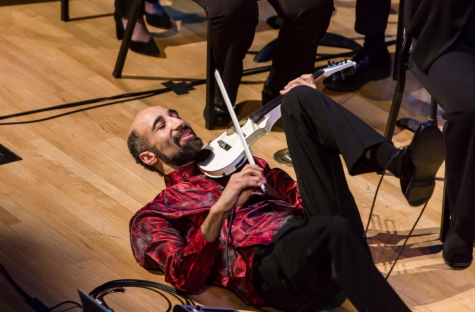
“Again, like with the whole musical family thing, it’s something that I inherited from the generation before. My mother and father met in Paris at a famous conservatoire, their academy, and they met in a way that would have been tough in the United States because he was black and she was white. Europe was a lot more open-minded, especially back in the day. They endured a lot of stuff here for as long as they lasted together. And then when I met Lori, I was the concertmaster, the leader of this orchestra in Colorado, and she came in and she auditioned for me – she did well. And then the real reason that I think we got together was that years before she met me, she was in L.A. for like five years, she played electric bass in heavy metal bands out there. When she auditioned for the orchestra, she played violin. And then, you know, obviously, you see her playing the keyboard. So it’s like, what’s not to be impressed by that?!”
We had another fifteen minutes of conversations about the diverse pool of music we listen to, recommendations – check out Lionel Young, the bluesiest classical violinist who studied with Jascha Heifetz, and the music departments at colleges and universities and if what they’re doing actually helps artists before I moved on to my last, and biggest question. Being involved with Curb Institute, I was able to take the front seat to see people transition from being students of music to becoming musicians. I wondered how that was for Dr. Walker. Finding your own voice, and finding your place in music must be the trickiest of all journeys for any artist. There’s a long answer that talks about how his abrupt transition from being a Ph.D. music student to becoming a professor at a university that supports his creative work didn’t give him a chance to have that much of a painful transition. Then there’s the short answer, which I found beautiful:
“… When it comes to finding the voice, I think it definitely helps to be searching for it. But it is kind of poetic for me and for a few people I know – when you start to find your voice in your advanced stage, you realize it’s one of those things that was hiding in plain sight. You can’t really fake it. I plan my stuff, so there is machination behind the performance, but in the end, it’s just who you are. And if it’s not, it’s going to be lacking, that’s not what we’re called to ignore as artists. That’s my theory.”



